Key takeaways:
- Poetry workshops foster community, creativity, and personal growth through shared experiences and constructive feedback.
- Effective workshops create a safe environment for vulnerability, structured feedback, and diverse writing prompts to stimulate creativity.
- Facilitators should build trust, remain flexible with agendas, and provide warmth and encouragement to nurture participants’ confidence.
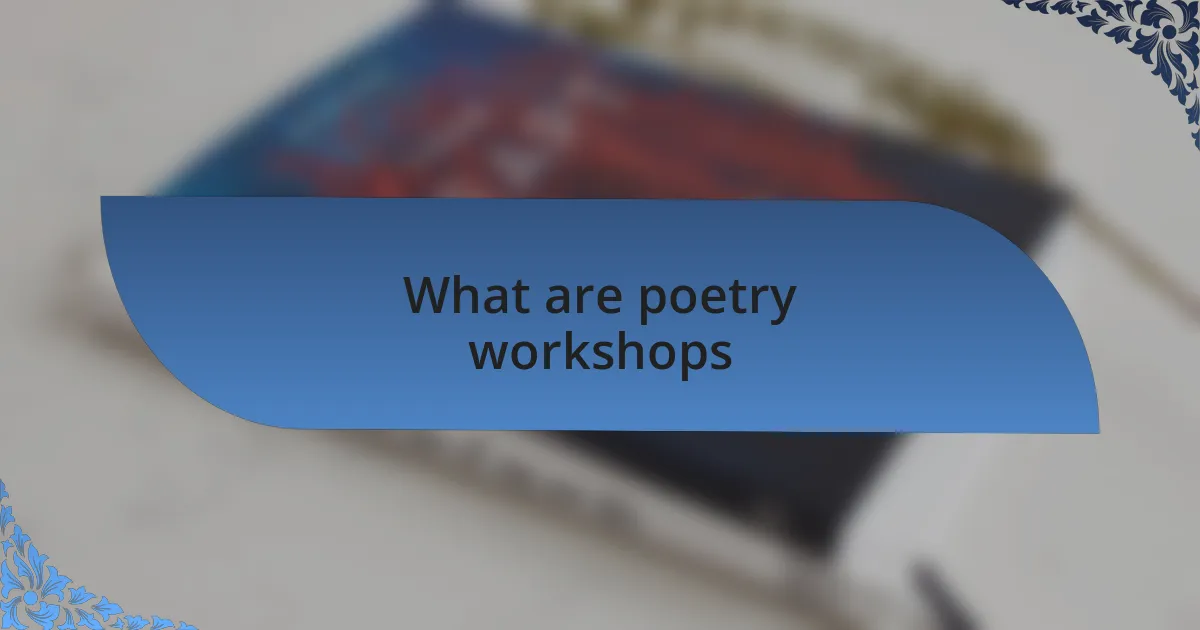
What are poetry workshops
Poetry workshops are spaces where individuals gather to explore the art of writing poetry together. Imagine sitting in a circle with fellow wordsmiths, sharing your latest verses and receiving constructive feedback. It can be exhilarating and a bit nerve-wracking—how often do we put our hearts on the page and wonder what others will think?
In my experience, these workshops serve as a catalyst for creativity. I vividly recall a session where someone shared a poem about loss, and the raw emotion resonated deeply with everyone in the room. It sparked a lively discussion about vulnerability in poetry, reminding us that our words can connect us in ways we often overlook. Isn’t it fascinating how a single poem can open up a dialogue that brings strangers together?
At their core, poetry workshops are about community and growth. They offer a nurturing environment that invites experimentation and boldness. Have you ever felt that urge to write but hesitated? In a workshop, that hesitation fades away as the supportive atmosphere encourages you to take risks and explore new themes or styles. This camaraderie can be transformative, leading to new artistic insights that might have remained undiscovered in solitude.
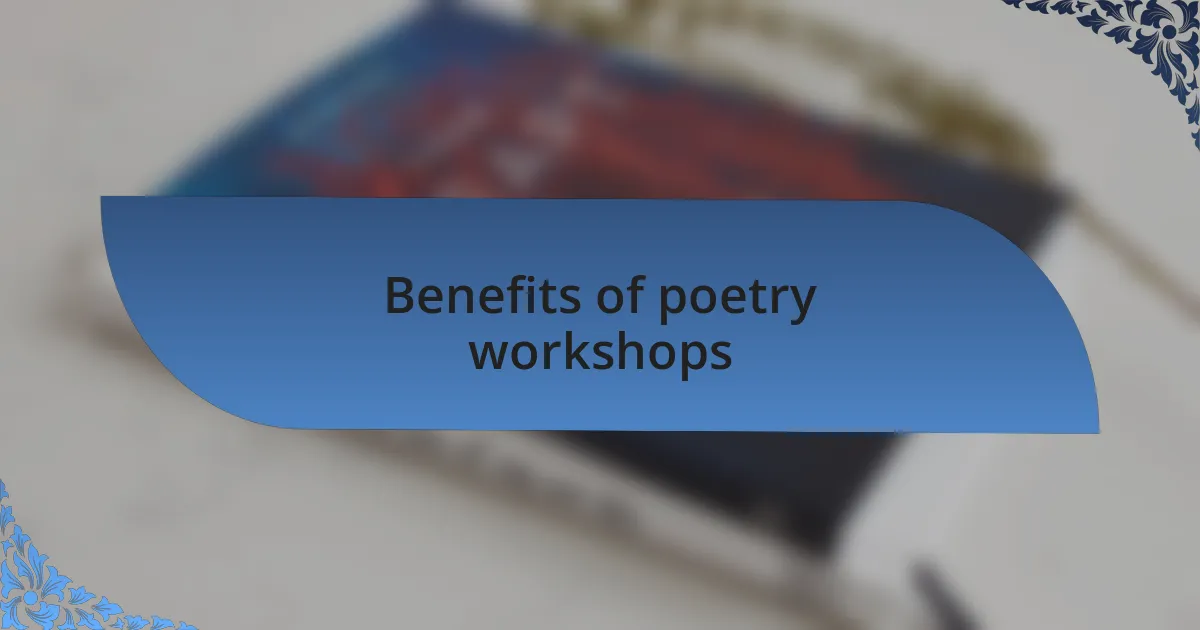
Benefits of poetry workshops
Participating in poetry workshops can significantly enhance your writing skills. From my own journey, I’ve found that receiving feedback from peers is invaluable. For instance, I remember a time when a fellow participant pointed out a metaphor in my poem that I hadn’t even realized was there. It was a revelation! Their insight helped me recognize the strength of my imagery and encouraged me to weave it even more intricately into my future work. How often do we overlook our strengths?
Moreover, workshops can expand your creative boundaries. I once experimented with a style I believed was too unconventional. To my surprise, my fellow writers embraced it, offering encouragement rather than criticism. It made me rethink the limitations I had imposed on my own creativity. Isn’t it liberating to break free from those self-imposed confines?
Lastly, the friendships formed in these workshops can be lasting and profound. I’ve forged connections that transcended mere writing; they became partnerships where we shared resources and inspirations long after the workshop ended. Each person brings a unique perspective, and that diversity enriches our understanding of poetry. How beautiful it is to be surrounded by people who understand the highs and lows of the creative process!
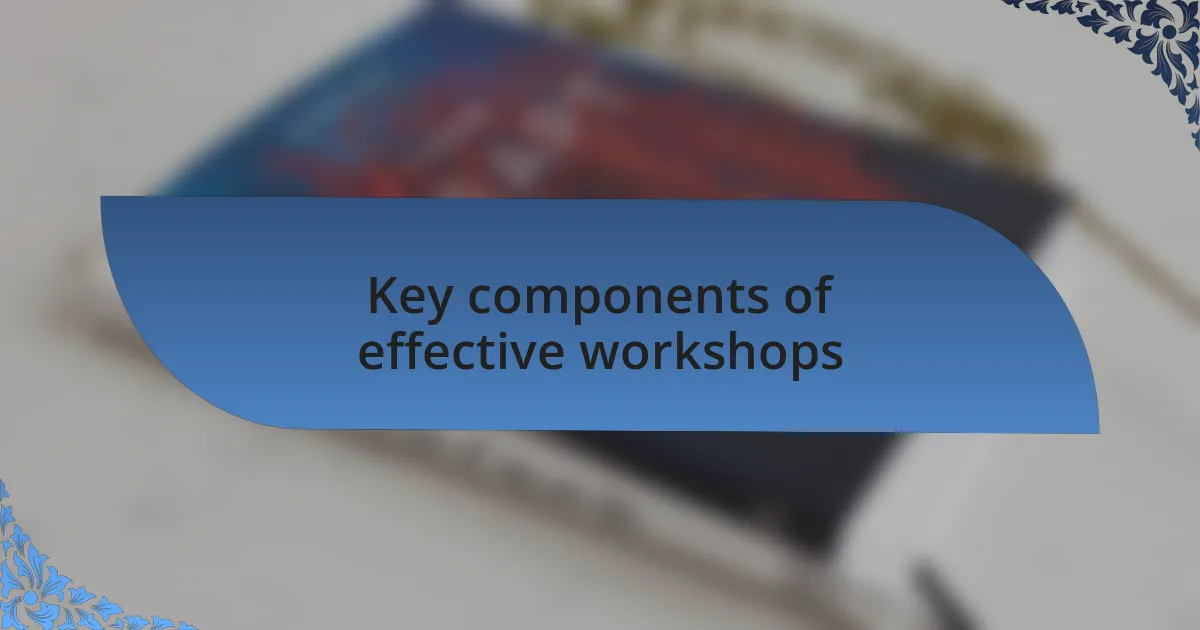
Key components of effective workshops
One key component of effective workshops is fostering a safe and supportive environment. I recall a particularly transformative session where the facilitator encouraged vulnerability by sharing their own early drafts. This act of openness set a precedent, prompting participants, myself included, to share our raw work without fear of judgment. Doesn’t it make a difference when we feel safe expressing our art?
Another vital element is structured feedback. I’ve experienced workshops that lack this focus, resulting in vague, unhelpful sentiments. In contrast, when criticism is framed constructively, as in the workshops I cherish most, it transforms into an opportunity for growth. For instance, a fellow writer’s suggestion to clarify my poem’s themes changed my entire approach, resonating deeply with my creative journey. Isn’t it amazing how a few thoughtful words can lead to a breakthrough?
Lastly, incorporating diverse writing prompts can stimulate creativity and spark unexpected connections. I vividly remember a prompt that asked us to write about an object in our room. The simplicity of that exercise led to a profound exploration of memory and nostalgia in my poetry. I often wonder how many hidden gems we might discover if we take the time to engage with the world around us in fresh ways. Don’t you think such exploration is crucial to evolving as a poet?
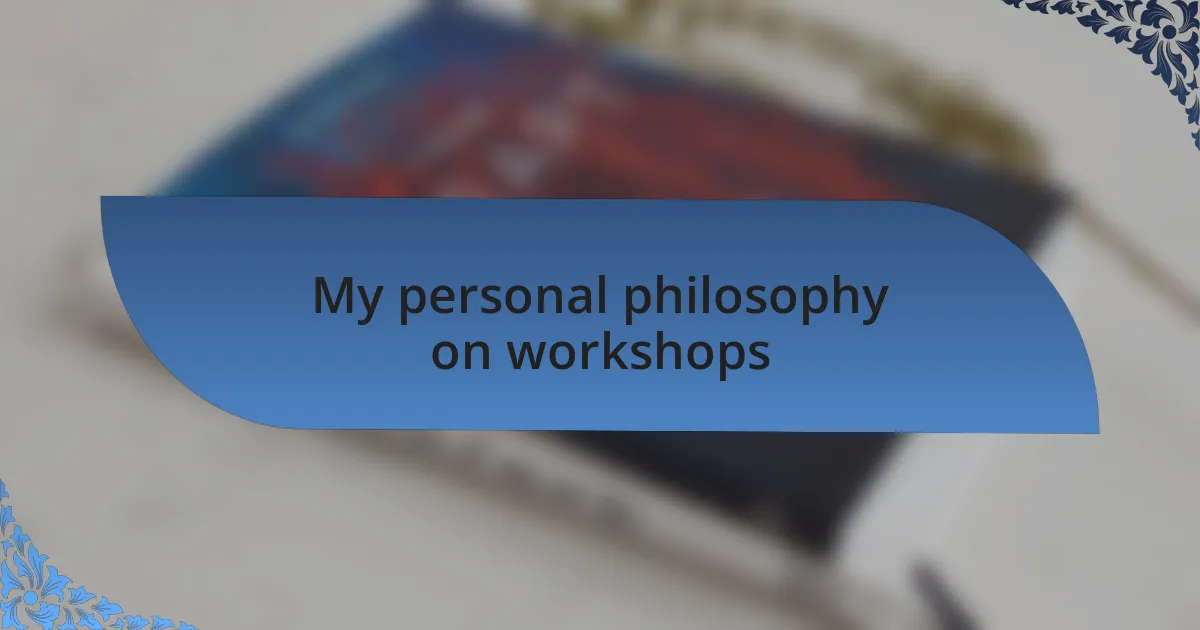
My personal philosophy on workshops
My philosophy on workshops revolves around the idea that poetry is a deeply personal journey but thrives in community settings. I remember during one workshop, we were tasked with writing a poem in ten minutes about our fears. The immediacy of those moments not only deepened my self-reflection but also created a profound connection among us. Isn’t it fascinating how shared vulnerabilities can bind people together?
I also believe in the power of mentorship and guidance within workshops. In one memorable session, an experienced poet took the time to offer individual advice based on our specific works. This personalized attention elevated my writing in ways I hadn’t anticipated. How often do we find ourselves stumbling upon insights that reshape our creative trajectory just because someone took the time to listen and understand?
Finally, I emphasize the importance of revisiting and revising in our writing process. I recall a workshop where we spent weeks refining drafts through constructive critique. Going back to our work with fresh eyes allowed me to discover layers I hadn’t seen before. Isn’t it remarkable how revisiting one’s own poems can unveil deeper meanings and artistic choices?
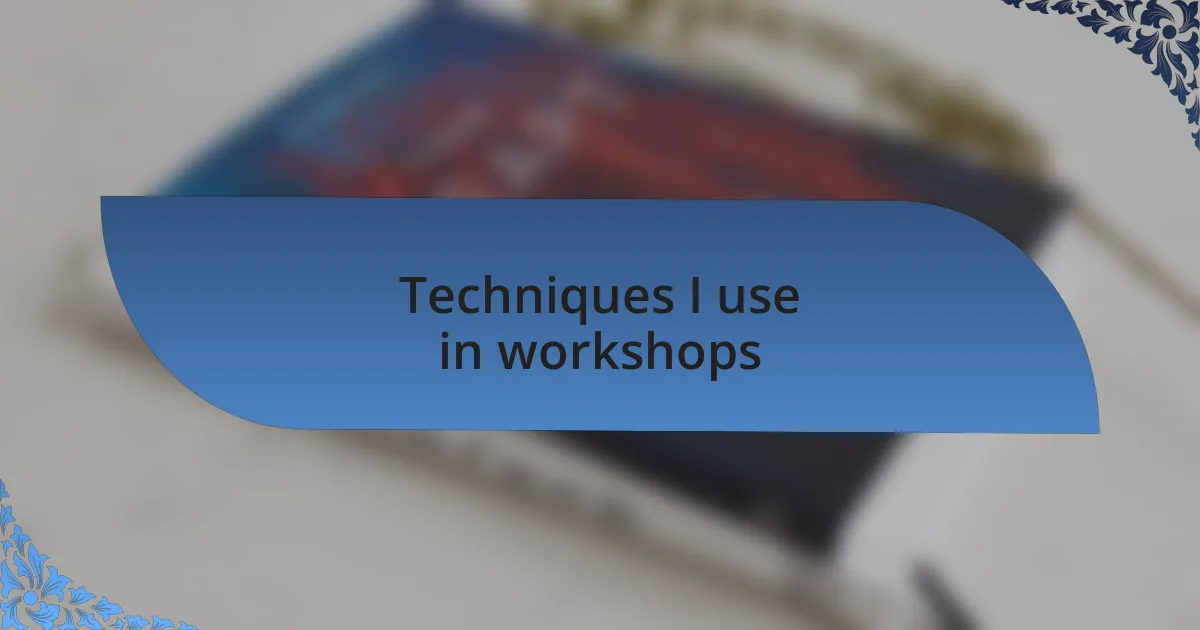
Techniques I use in workshops
In my workshops, one technique I love to use is group improvisation. I often encourage participants to take turns prompting one another with a single word or image. This randomness can spark creativity in ways that we might not expect. I remember one session where a simple prompt of “sea” led to a poem about dreams washing ashore, filled with poignant nostalgia. Isn’t it amazing how a single word can unlock a cascade of emotions and ideas?
Another technique I frequently employ is the use of sound. We experiment with reading our poems aloud, paying attention to rhythm and tonal shifts. During one workshop, I introduced the concept of oral tradition, and a participant’s voice quivered with emotion as they recited their piece. That moment reminded me of how powerful our voices can be when they are fully engaged in our words. Have you ever noticed how certain lines resonate more when spoken aloud?
Finally, I always encourage participants to step outside their comfort zones with unconventional prompts. In one memorable exercise, I asked everyone to write a poem from the perspective of an inanimate object. The results were often surprising and delightful. One poet chose a streetlamp, weaving a narrative filled with forgotten tales of night. It got me thinking: don’t you find it invigorating to see the world through a different lens?
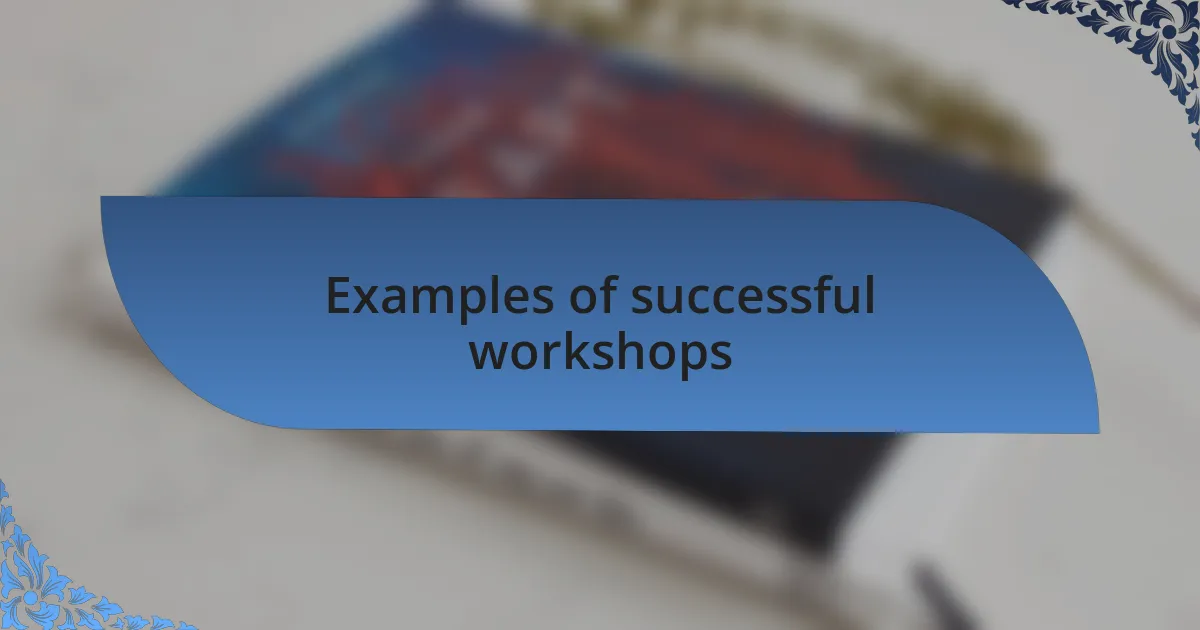
Examples of successful workshops
One of the most successful workshops I facilitated revolved around the theme of vulnerability in writing. I recall a participant who initially hesitated to share her work, fearing judgment. After some encouragement, she unveiled a deeply personal poem about loss, and the room filled with an intense silence that felt like a collective breath. It struck me how creating a safe space can ignite such honesty among writers. Have you ever felt that rush when sharing something profoundly personal?
Another workshop that stands out involved a collaboration with local musicians. We combined poetry with live music, allowing participants to explore how sound affects emotion in their writing. One participant wrote a powerful piece that came to life when set against a haunting cello melody. It was fascinating to see how the combination of these art forms not only enhanced the poetry but also deepened the connection between the creators and their audience. Isn’t it incredible how art can transform in unexpected ways?
A memorable workshop was one focused on place-based poetry, where participants had to write a piece inspired by a specific location in our town. I remember a young man who penned a poem about a forgotten alley, giving it a voice and a story. The transformation that took place, from mere observation to the creation of vivid imagery, was inspiring. It got me thinking about how our surroundings can become our greatest muses—how often do we overlook the stories waiting to be told in our own backyards?
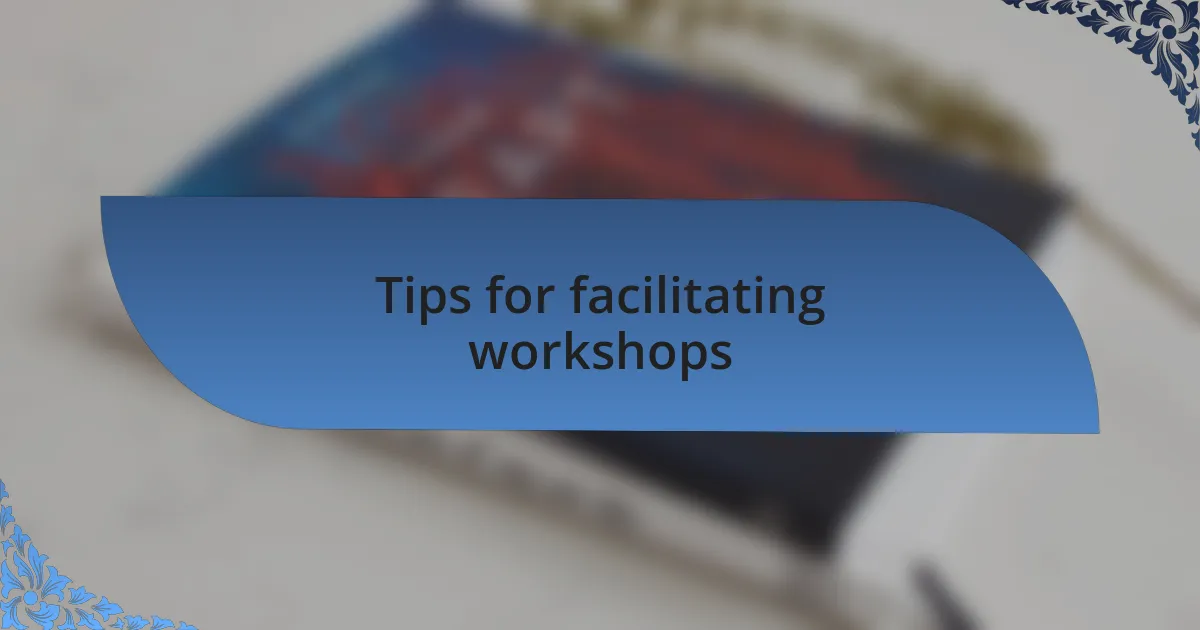
Tips for facilitating workshops
When facilitating a workshop, establishing trust is crucial. In one session, I encouraged participants to share their fears about writing in a circle. As each person spoke, I could see their shoulders relax, creating a ripple effect of vulnerability. It reminded me that when we acknowledge our insecurities, we pave the way for authentic connections. Have you ever experienced that moment when the air in the room shifts, feeling charged with shared understanding?
Another effective tip is to embrace flexibility in your agenda. In one workshop, I planned specific prompts but found the group gravitating towards a discussion about the power of metaphor. Instead of sticking rigidly to my plan, I adapted and let the conversation flow. It was enlightening to witness how a simple change of direction sparked richer creative outcomes. How often do we underestimate the potential for creativity when we allow space for spontaneity?
Lastly, I believe in the power of warmth and encouragement. During a workshop on rhythmic poetry, I noticed a young writer who hesitated to share her piece. I affirmed her voice, sharing my own struggles with performance anxiety. When she finally read her poem aloud, the joy in her eyes was unforgettable. It’s in these moments that I realize how vital it is to nurture each writer’s confidence. What if we all embraced our fears and shared our voices more openly?